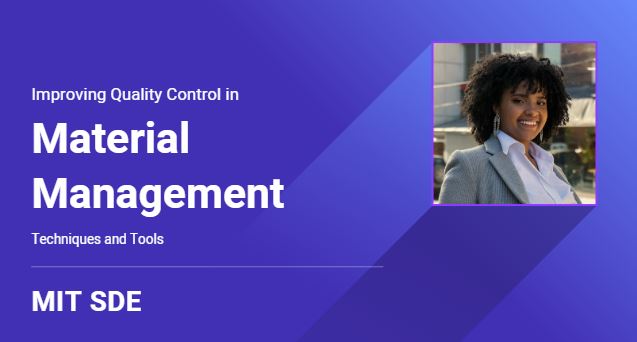
Effective quality control in material management is crucial for maintaining high production standards and minimizing costs associated with defective materials. From selecting the right suppliers to implementing state-of-the-art quality assessment tools, a robust quality control strategy ensures that materials meet stringent standards before they enter the production process. This blog explores essential techniques and tools to optimize quality control and offers insights into how a Post Graduate Diploma in Material Management can equip professionals with the skills needed to excel in this field.
Why Quality Control Matters in Material Management
Quality control in material management ensures that only the best materials are used in manufacturing, safeguarding product integrity, reducing wastage, and improving customer satisfaction. Industries ranging from automotive to electronics rely on high-quality raw materials to maintain competitive advantage. In such sectors, professionals with specialized qualifications, like a PG Diploma in Material Management, are highly sought after, as they bring essential skills in sourcing, evaluating, and managing materials effectively.
Techniques for Improving Quality Control in Material Management
Here are some proven techniques that material managers can implement to uphold quality standards in their operations:
- Supplier Quality Assurance (SQA)
- Building a strong Supplier Quality Assurance program involves working closely with suppliers to ensure that their materials consistently meet the required specifications. Regular audits, site visits, and collaborative quality improvement initiatives foster trust and consistency. Professionals trained through programs like the PGDM in Material Management often bring specialized knowledge in supplier evaluation, adding value to SQA processes.
- Statistical Process Control (SPC)
- SPC uses statistical methods to monitor and control material quality, enabling early detection of any deviations from set quality standards. For example, control charts and variance analysis allow managers to understand fluctuations in material quality over time, reducing the risk of substandard materials reaching the production line.
- Failure Mode and Effect Analysis (FMEA)
- FMEA is a proactive approach that helps identify potential failure points within the material management process, assessing their impact and likelihood. By evaluating risk factors, companies can develop mitigation strategies to prevent defects from arising. Such knowledge, imparted through best PG Diploma programs in Material Management, ensures that managers can anticipate quality issues effectively.
- Incoming Quality Control (IQC)
- IQC is the process of inspecting materials as they arrive from suppliers. This step is essential in industries where slight defects can lead to costly production errors. By implementing IQC protocols, material managers can catch issues before materials move to production, reducing wastage and downtime.
- ISO Certification and Compliance Audits
- Ensuring compliance with ISO standards, such as ISO 9001, is a hallmark of quality. Periodic audits not only validate the quality of incoming materials but also streamline processes, making them more efficient. Professionals with a Post Graduate Diploma in Material Management are often trained to conduct these audits, helping organizations maintain compliance.
Essential Tools for Quality Control in Material Management
To support these techniques, various tools enable material managers to track, evaluate, and ensure quality. Here’s a look at some of the most effective tools:
- Automated Inspection Tools
- Automated tools, such as coordinate measuring machines (CMM) and laser scanners, enable accurate and rapid inspection of materials. These tools reduce human error, offering precise data on material dimensions and consistency, critical for industries like manufacturing and aerospace.
- Inventory Management Software with Quality Modules
- Many advanced inventory management systems, such as SAP and Oracle, feature built-in quality management modules. These tools help track material quality at every stage of the supply chain, alerting managers to issues and maintaining comprehensive records.
- Quality Management Systems (QMS)
- A QMS integrates quality planning, assurance, control, and improvement processes across the organization. Such systems help enforce standardized quality checks, improve traceability, and streamline compliance efforts.
- Data Analytics Platforms
- Modern data analytics platforms can analyze large data sets to identify patterns in material quality. These insights are valuable for predicting quality issues and planning preventive actions, a skill emphasized in best material management courses.
- Barcode and RFID Tracking
- Barcoding and RFID systems enable efficient tracking and identification of materials, ensuring that only quality-verified materials make it to the production floor. They also help in creating a transparent audit trail, essential for compliance and process improvements.
How a Post Graduate Diploma in Material Management Can Boost Your Skills in Quality Control
The increasing demand for quality control in material management is leading professionals to pursue specialized courses, such as a Post Graduate Diploma in Material Management (PGDM Material Management). These programs provide in-depth knowledge of best practices, emerging technologies, and key quality control techniques. Here’s how these courses help:
- Comprehensive Curriculum: Courses cover everything from supplier management to quality control techniques, preparing graduates to tackle real-world challenges.
- Hands-on Training: With practical case studies, students learn how to apply quality management techniques in real-life scenarios.
- Networking Opportunities: By joining the best PG diploma programs, you connect with peers and industry leaders, expanding career opportunities in material management.
- Career Advancement: A PG diploma in material management can open doors to roles like Material Manager, Quality Control Manager, and Supply Chain Analyst, all of which benefit from advanced quality management knowledge.
Conclusion
Quality control is the backbone of effective material management, ensuring that only the highest quality materials go into production, thereby boosting operational efficiency and customer satisfaction. By employing techniques like SQA, SPC, and FMEA, and leveraging tools such as automated inspection systems and QMS, organizations can significantly improve material quality.
For those aiming to build a career in material management, a Post Graduate Diploma in Material Management offers invaluable expertise in quality control and supply chain processes. With the right training, professionals can drive substantial quality improvements within their organizations, making the PGDM in material management an excellent choice for those looking to specialize in this critical field.


